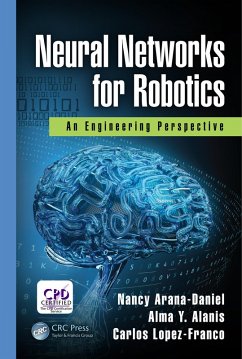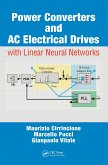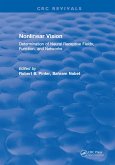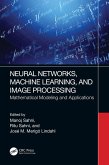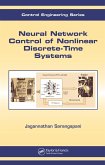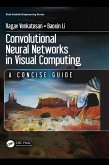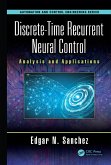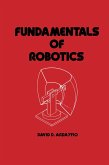Nancy Arana-Daniel, Alma Y. Alanis, Carlos Lopez-Franco
Neural Networks for Robotics (eBook, ePUB)
An Engineering Perspective
62,95 €
62,95 €
inkl. MwSt.
Sofort per Download lieferbar

31 °P sammeln
62,95 €
Als Download kaufen

62,95 €
inkl. MwSt.
Sofort per Download lieferbar

31 °P sammeln
Jetzt verschenken
Alle Infos zum eBook verschenken
62,95 €
inkl. MwSt.
Sofort per Download lieferbar
Alle Infos zum eBook verschenken

31 °P sammeln
Nancy Arana-Daniel, Alma Y. Alanis, Carlos Lopez-Franco
Neural Networks for Robotics (eBook, ePUB)
An Engineering Perspective
- Format: ePub
- Merkliste
- Auf die Merkliste
- Bewerten Bewerten
- Teilen
- Produkt teilen
- Produkterinnerung
- Produkterinnerung

Bitte loggen Sie sich zunächst in Ihr Kundenkonto ein oder registrieren Sie sich bei
bücher.de, um das eBook-Abo tolino select nutzen zu können.
Hier können Sie sich einloggen
Hier können Sie sich einloggen
Sie sind bereits eingeloggt. Klicken Sie auf 2. tolino select Abo, um fortzufahren.

Bitte loggen Sie sich zunächst in Ihr Kundenkonto ein oder registrieren Sie sich bei bücher.de, um das eBook-Abo tolino select nutzen zu können.
The book offers an insight on artificial neural networks for giving a robot a high level of autonomous tasks, such as navigation, object recognition, and clustering, with real-time implementations. It provides methodologies for a wide range of artificial neural network architectures to solve problems in autonomous navigation and object recognition.
- Geräte: eReader
- mit Kopierschutz
- eBook Hilfe
- Größe: 12.44MB
Andere Kunden interessierten sich auch für
![Power Converters and AC Electrical Drives with Linear Neural Networks (eBook, ePUB) Power Converters and AC Electrical Drives with Linear Neural Networks (eBook, ePUB)]() Maurizio CirrincionePower Converters and AC Electrical Drives with Linear Neural Networks (eBook, ePUB)102,95 €
Maurizio CirrincionePower Converters and AC Electrical Drives with Linear Neural Networks (eBook, ePUB)102,95 €![Nonlinear Vision: Determination of Neural Receptive Fields, Function, and Networks (eBook, ePUB) Nonlinear Vision: Determination of Neural Receptive Fields, Function, and Networks (eBook, ePUB)]() Robert B. PinterNonlinear Vision: Determination of Neural Receptive Fields, Function, and Networks (eBook, ePUB)304,95 €
Robert B. PinterNonlinear Vision: Determination of Neural Receptive Fields, Function, and Networks (eBook, ePUB)304,95 €![Neural Networks, Machine Learning, and Image Processing (eBook, ePUB) Neural Networks, Machine Learning, and Image Processing (eBook, ePUB)]() Neural Networks, Machine Learning, and Image Processing (eBook, ePUB)51,95 €
Neural Networks, Machine Learning, and Image Processing (eBook, ePUB)51,95 €![Neural Network Control of Nonlinear Discrete-Time Systems (eBook, ePUB) Neural Network Control of Nonlinear Discrete-Time Systems (eBook, ePUB)]() Jagannathan SarangapaniNeural Network Control of Nonlinear Discrete-Time Systems (eBook, ePUB)231,95 €
Jagannathan SarangapaniNeural Network Control of Nonlinear Discrete-Time Systems (eBook, ePUB)231,95 €![Convolutional Neural Networks in Visual Computing (eBook, ePUB) Convolutional Neural Networks in Visual Computing (eBook, ePUB)]() Ragav VenkatesanConvolutional Neural Networks in Visual Computing (eBook, ePUB)75,95 €
Ragav VenkatesanConvolutional Neural Networks in Visual Computing (eBook, ePUB)75,95 €![Discrete-Time Recurrent Neural Control (eBook, ePUB) Discrete-Time Recurrent Neural Control (eBook, ePUB)]() Edgar N. SanchezDiscrete-Time Recurrent Neural Control (eBook, ePUB)71,95 €
Edgar N. SanchezDiscrete-Time Recurrent Neural Control (eBook, ePUB)71,95 €![Fundamentals of Robotics (eBook, ePUB) Fundamentals of Robotics (eBook, ePUB)]() David ArdayfioFundamentals of Robotics (eBook, ePUB)65,95 €
David ArdayfioFundamentals of Robotics (eBook, ePUB)65,95 €-
-
-
The book offers an insight on artificial neural networks for giving a robot a high level of autonomous tasks, such as navigation, object recognition, and clustering, with real-time implementations. It provides methodologies for a wide range of artificial neural network architectures to solve problems in autonomous navigation and object recognition.
Dieser Download kann aus rechtlichen Gründen nur mit Rechnungsadresse in A, B, BG, CY, CZ, D, DK, EW, E, FIN, F, GR, HR, H, IRL, I, LT, L, LR, M, NL, PL, P, R, S, SLO, SK ausgeliefert werden.
Produktdetails
- Produktdetails
- Verlag: Taylor & Francis eBooks
- Seitenzahl: 246
- Erscheinungstermin: 6. September 2018
- Englisch
- ISBN-13: 9781351231770
- Artikelnr.: 54362304
- Verlag: Taylor & Francis eBooks
- Seitenzahl: 246
- Erscheinungstermin: 6. September 2018
- Englisch
- ISBN-13: 9781351231770
- Artikelnr.: 54362304
- Herstellerkennzeichnung Die Herstellerinformationen sind derzeit nicht verfügbar.
Nancy Arana-Daniel received her B.Sc. Degree from the University of Guadalajara in 2000, and her M. Sc. And Ph.D. degrees in electric engineering with the special field in computer science from Research Center of the National Polytechnic Institute and Advanced Studies, CINVESTAV, in 2003 and 2007, respectively. She is currently a research fellow at the University of Guadalajara, in the Department of Computer Science México, where she is working at the Laboratory of Intelligent Systems and the Research Center for Control Systems and Artificial Intelligence. She is IEEE Senior member and a member of National System of Researchers (SNI-1). She has published several papers in International Journals and Conferences, and she has been technical manager of several projects that have been granted by the National Council of Science and Technology (CONACYT). Also, she has collaborated in an international project granted by OPTREAT. She is Associated Editor of the Journal of Franklin Institute (Elsevier). Her research interests focus on applications of Geometric Algebra to Geometric computing, machine learning, bio-inspired optimization, pattern recognition, and robot navigation.
Carlos Lopez-Franco gained his Ph.D. in Computer Science in 2007 from the Center of Research and Advanced Studies, CINVESTAV Unidad Guadalajara, Jalisco, México. Currently, he is a full professor at the University of Guadalajara, México, Department of Computer Science. He is currently working with the Intelligent Systems group, and he is the head of the department of Computer Sciences at CUCEI, Universidad de Guadalajara. His current research interests include geometric algebra, computer vision, robotics, and pattern recognition.
Alma Y. Alanis received her B.Sc degree from Instituto Tecnologico de Durango (ITD, Durango Campus, Durango) in 2002, and her M.Sc. and Ph.D. degrees in electrical engineering from the Advanced Studies and Research Center of the National Polytechnic Institute (CINVESTAV-IPN, Guadalajara Campus, Mexico) in 2004 and 2007, respectively. Since 2008, she has been with the University of Guadalajara, where she is currently a Chair Professor in the Department of Computer Science. She is also a member of the Mexican National Research System (SNI-2). She has published papers in recognized International Journals and Conferences, along with two international books. She is a Senior Member of the IEEE and Subject and Associated Editor of the Journal of Franklin Institute (Elsevier) and Intelligent Automation & Soft Computing (Taylor & Francis); moreover, she is currently serving on a number of IEEE and IFAC Conference Organizing Committees. In 2013, she received the grant for women in science by L'Oreal-UNESCO-AMC-CONACYT-CONALMEX. In 2015, she received the Marcos Moshinsky Research Award. Since 2008, she has been a member of the Accredited Assessors record (RCEA-CONACYT), evaluating a wide range of national research projects. She has belonged to important project evaluation committees for national and international research projects. Her research interests are in neural control, backstepping control, block control, and their applications to electrical machines, power systems, and robotics.
Carlos Lopez-Franco gained his Ph.D. in Computer Science in 2007 from the Center of Research and Advanced Studies, CINVESTAV Unidad Guadalajara, Jalisco, México. Currently, he is a full professor at the University of Guadalajara, México, Department of Computer Science. He is currently working with the Intelligent Systems group, and he is the head of the department of Computer Sciences at CUCEI, Universidad de Guadalajara. His current research interests include geometric algebra, computer vision, robotics, and pattern recognition.
Alma Y. Alanis received her B.Sc degree from Instituto Tecnologico de Durango (ITD, Durango Campus, Durango) in 2002, and her M.Sc. and Ph.D. degrees in electrical engineering from the Advanced Studies and Research Center of the National Polytechnic Institute (CINVESTAV-IPN, Guadalajara Campus, Mexico) in 2004 and 2007, respectively. Since 2008, she has been with the University of Guadalajara, where she is currently a Chair Professor in the Department of Computer Science. She is also a member of the Mexican National Research System (SNI-2). She has published papers in recognized International Journals and Conferences, along with two international books. She is a Senior Member of the IEEE and Subject and Associated Editor of the Journal of Franklin Institute (Elsevier) and Intelligent Automation & Soft Computing (Taylor & Francis); moreover, she is currently serving on a number of IEEE and IFAC Conference Organizing Committees. In 2013, she received the grant for women in science by L'Oreal-UNESCO-AMC-CONACYT-CONALMEX. In 2015, she received the Marcos Moshinsky Research Award. Since 2008, she has been a member of the Accredited Assessors record (RCEA-CONACYT), evaluating a wide range of national research projects. She has belonged to important project evaluation committees for national and international research projects. Her research interests are in neural control, backstepping control, block control, and their applications to electrical machines, power systems, and robotics.
